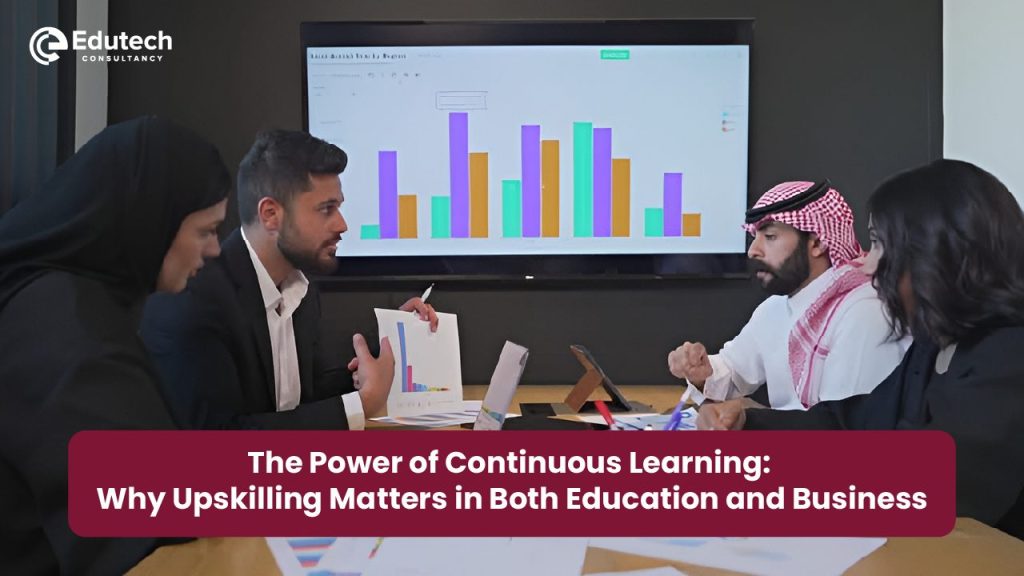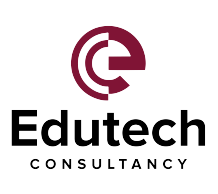Workplace learning and upskilling have become essential components in both the education and business sectors. As technological advancements accelerate and industries evolve, the ability to adapt and acquire new skills is crucial for individuals and organisations alike.
The phenomenon known as FOBO, or “fear of becoming obsolete,” has emerged as a significant concern among professionals. A Gallup poll highlighted that 22% of U.S. workers worry about job obsolescence due to technology. This anxiety underscores the critical need for continuous investment in employee reskilling to ensure that AI and other technologies complement human roles rather than replace them.
This article explores the significance of continuous learning, its impact on personal and professional development, and the role of Edutech consultancy in facilitating this ongoing educational journey.
In today’s rapidly changing world, the concept of a static education leading to a lifelong career is obsolete. Technological innovations, particularly in artificial intelligence (AI), are transforming industries at an unprecedented pace. This evolution necessitates a workforce that is not only skilled but also adaptable and committed to lifelong learning.
The Imperative of Workplace Learning
Workplace learning refers to the ongoing expansion of knowledge and skill sets. It’s about consistently seeking to improve oneself, staying updated with the latest trends, and adapting to new challenges. In the context of education and business, this approach is vital for several reasons:
- Adaptability to Change: The business landscape is in a state of constant instability. Companies must keep pace with industry trends and technological advancements to stay competitive. Encouraged continuous learning among employees ensures that the workforce remains up-to-date with the latest developments, positioning the company to adapt quickly to changes in the market and seize new opportunities for growth.
- Enhanced Performance: Regular training and development opportunities help employees improve their performance. When employees feel competent and confident in their roles, their productivity increases, directly impacting the company’s bottom line. Companies that invest in their workforce’s development often see higher quality work and greater efficiency.
- Employee Engagement and Retention: Offering continuous learning opportunities shows employees that the company is invested in their growth. This investment can lead to higher levels of job satisfaction, increased engagement, and reduced turnover rates. Retaining skilled employees is vital, as it can be costly and disruptive to frequently hire and train new staff.
- Innovation and Growth: A culture that values continuous learning is inherently geared toward innovation. Employees who are constantly learning are more likely to experiment and take calculated risks, leading to breakthroughs and advancements. This culture of innovation can set a company apart from its competitors, making it a leader in its field.

Continuous Learning in Education
In the educational sector, continuous learning is paramount for educators to provide high-quality instruction and foster student success. By engaging in ongoing professional development, teachers can:
- Stay Current with Pedagogical Strategies: Education is an ever-evolving field. Continuous learning enables educators to stay informed about the latest teaching methodologies, ensuring they can effectively meet diverse student needs.
- Integrate Technology Effectively: With the rapid advancement of educational technologies, teachers must continually update their tech skills to enhance classroom engagement and learning outcomes.
- Foster a Growth Mindset: By modelling lifelong learning, educators inspire students to adopt a similar mindset, encouraging curiosity and resilience.

Continuous Learning in Business
For businesses, fostering a culture of continuous learning is crucial for maintaining a competitive edge. Key benefits include:
- Improved Productivity: Investing in continuous learning initiatives results in a more skilled and competent workforce, which directly translates into improved job performance and productivity across the organisation.
- Skill Sharing Among Employees: Continuous learning encourages the sharing of knowledge among employees, fostering a collaborative environment where team members learn from each other’s experiences and expertise.
- Compliance and Risk Management: Continuous education ensures your organisation stays compliant with evolving industry regulations, reducing legal risks.
The Role of Edutech Consultancy
Edutech Consultancy stands at the forefront of promoting continuous learning within both educational institutions and corporate environments. By offering tailored workshops and training programs, Edutech Consultancy addresses the unique needs of its clients, ensuring that both individuals and organisations can thrive in today’s dynamic landscape.
Services Offered:
- Workshops for Schools and Teachers: These sessions are designed to empower educators with innovative teaching strategies and the latest educational technologies, enhancing pedagogical skills and improving student outcomes.
- Workshops for Organisations: customised workshops aimed at boosting both professional and personal development skills, promoting innovation and success in the workplace.
- Professional Development Programs: A range of programs that cater to various aspects of professional growth, from classroom management to integrating Montessori methods in classrooms.
By collaborating with Edutech Consultancy, organisations can ensure they are not only keeping pace with industry changes but are also positioned to lead and innovate.
Conclusion
Continuous learning and upskilling are no longer optional but essential components of personal and organisational development. They enhance employee skills, boost engagement, foster innovation, prepare organisations for future challenges, and improve company reputation. Edutech consultancy, through their tailored services and programs, facilitates this ongoing educational journey, ensuring that individuals and organisations remain competitive, innovative, and prepared for the future.


